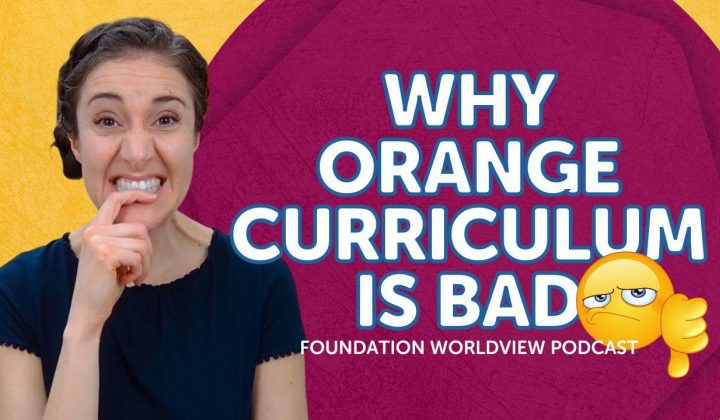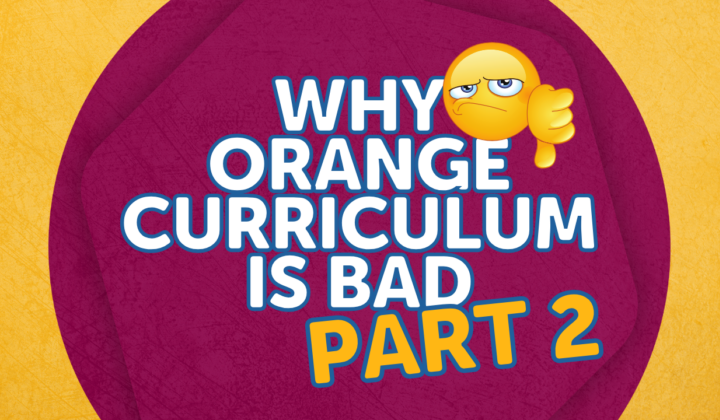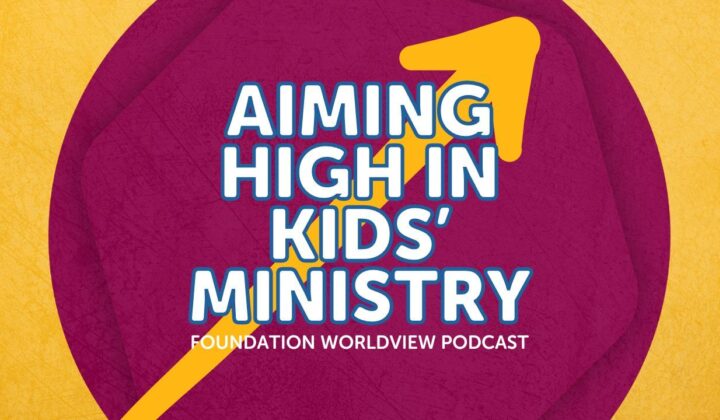Learn more about the journey that led to us equipping kids to carefully evaluate every idea they encounter.
Meet members of our team who have contributed to curriculum development.
Hear from real users of the Foundation Curriculum.
Learn what we believe about God, Jesus, Scripture, and more.
Are Church Programs Helping Your Kids Grow Biblically?
How do you evaluate whether a church program or curriculum, like Awana, is biblically sound and worth your child’s time? In this episode, Elizabeth Urbanowicz shares a practical framework to help parents assess the faithfulness and impact of any program. Learn three essential questions to ask, including whether the program is biblically faithful, if it provides transferable skills, and what your family might sacrifice by participating. This episode will help you make informed, intentional decisions for your child’s discipleship journey.
Transcript
Note: The following is an auto-transcript of the podcast recording.
Hello, friends. Today's podcast question says, "Hi Elizabeth. I just wanted to get your thoughts on Awana and if it's a biblically sound program or if it's more like Orange. Thanks for your help with this." Well, this question is about Awana, and if I am being honest, I do not know a whole ton about Awana. I have heard from a lot of friends who have their kids involved in it that it involves a lot of Bible memory, and I have heard good things about it. However, I personally have never been part of Awana and I have never looked through their materials. And you may be thinking, well, Elizabeth, why are you recording this podcast? Why didn't you look through Awana materials just like you did Orange's materials or the Good and the Beautiful's materials? And that is a good question. The reason that I did not look through it is I have not heard anything about Awana that is cause for alarm. Now, that doesn't mean that there is nothing cause there is no things in the curriculum that are cause for alarm. However, I was not going to invest hours of my time investigating one of many, many programs if I haven't heard things alarming about it.
So what we're going to do in this podcast is rather than specifically evaluating Awana, I am going to go through what I think is a really good and helpful paradigm for any time we are evaluating whether or not our kids should be involved in a certain program or curriculum or ministry series. So this is what we're going to dive down deep into today on the Foundation Worldview Podcast, where we seek to answer your questions so that you can equip the children that God has placed in your care to carefully evaluate every idea they encounter and understand the truth of the biblical worldview.
Now, those of you who are faithful Foundation Worldview followers, you know that we are not primarily a podcast, that the podcast that we have is just one very small arm of our ministry, that we are primarily a curriculum creation company. And so this is one of the reasons why I do not do a whole ton of curriculum reviews because it could be taken in the wrong way thinking like, oh, well, you're just trying to push down other curriculum so that you can exalt your curriculum, which that's not at all what we're trying to do. In fact, here at Foundation Worldview, we are not an all-encompassing curriculum. We say that we're a supplemental curriculum and that we're trying to do very specific things to help you get your kids to think critically and biblically. So we help specifically in the areas of biblical thinking, biblical literacy, and biblical sexuality. So if you'd like more information about what we primarily do, check out our website at FoundationWorldview.com. You can get all the information there.
But now as we're thinking about evaluating a program or a curriculum such as Awana, I think there are three main questions that we can ask ourselves to evaluate whether or not the materials are sound and whether or not our children should be involved with them. The first question that I think we should ask is, are the materials used biblically faithful? I'll say that one more time. Are the materials used biblically faithful? And what I mean by this is do they accurately teach Scripture? Do they teach passages of Scripture or narratives from Scripture in context, or do they just take one or two verses here or there and focus on them? We want to make sure that anytime our kids are immersed in Scripture, they're immersed in that Scripture in context with the meaning that the original author intended to be there. By biblically faithful, I also mean does this material, does this content primarily focus on God and his story, or does it mostly focus on us and our personal stories? Now obviously Scripture is meant to be applied to our lives personally. Okay? We're told in James that we're not just to be hearers of the word, but we're to be doers also. So yes, Scripture does apply to our lives, but a lot of times what materials for children and materials for adults do is they put all of the focus on us rather than placing the primary focus on God because Scripture is primarily about God. And then when we take that primary proper focus of God and his story, then we glean how that applies to our lives. But we want to ask ourselves anytime we're evaluating materials, is this lifting our children's eyes towards Jesus? Or is this focusing their eyes on themselves? What do these materials do? So that's what I mean by biblically faithful. Are they teaching Scripture in context? Are they interpreting it accurately? And are they primarily focusing on God and his story, or are they primarily focusing on us as the heroes of the story?
A second question that I think is really helpful for us to ask ourselves is, will my children gain skills that transfer into real life? Because anytime we are taking up a portion of our children's time with something, we want to make sure that it is a wise investment. And so we don't want them to be involved in a program that just has some isolated stories here or there that's not actually teaching them skills that are going to transfer out into real life. So a good question to ask ourselves with this is are they teaching my children how to think biblically? Are they modeling for them how to read a passage of Scripture, how to interpret it, and then how to apply it to their lives? Are they teaching my child how to soundly approach Scripture? Do they model how to read Scripture well. And then we want to ask what skills are they actually teaching my child? Are there skills that are going to transform the way that they think, that are going to carry with them beyond this program? Or is it something that's just going to stay right here? I think a healthy analogy is the difference between memorizing how to play one song on the piano and actually learning skills for how to play the piano so that you can play any song on the piano. Our children could memorize one song on the piano and we could listen to them perform and we could clap and be so proud of them. But if they knew how to play that one song in the piano and that's what they were taught, that's all they knew how to do, they just know how to play that one song on the piano. They're going to be ill-equipped to read music to play any other song. But if our children actually go to piano lessons and they learn the different keys and the correct fingers to place on each key and the name of the musical notes that are played by each of the individual keys, and then they're also taught how to read music and they're taught different time signatures, they're taught what each of the notes mean. They're taught the difference between a quarter note and a half note and an eighth note. And then they're taught little by little by little how to play the piano. They will then be able to take those piano skills and transfer them in any musical situation. Versus just being taught how to play a song, all they know how to do is play that song. So is this program just teaching our kids Bible stories or is it giving them skills in how to correctly approach God's word. Skills that are going to transfer outside of this program and actually apply to them as they seek God, Lord willing, all the days of their lives? So the first question I thought we should ask is, are the materials used biblically faithful? Second question, will my children gain skills that transfer into real life?
And then the third question I think we should ask ourselves is what will we be sacrificing as a family to participate in this program? And the reason that I think this question is so important is because anytime we are saying yes to something, we are subsequently saying no to other things. A really easy example of this is when you stood at the altar before your spouse and you said, I do or I will. However, the pastor had you phrase it, you were saying yes to your spouse and you were therefore saying no to every other person on the planet. You were saying, yes, I am committed to you and saying, no, I'm not going to commit to any other person in this way. Similarly, with our time, whenever we say yes to something, we have said no to everything else right now. I'm recording this podcast. I said yes to recording this podcast that in this moment I said no to curriculum writing, I said no to cooking, I said no to meeting with other people. I said no to being interviewed on other podcasts. I said no to doing laundry and a host of other things. And so we need to evaluate what are we saying no to in order to participate in this program? Because we live in a world where there are so many good things and praise God that we live in a world where there are so many good things to choose from. It truly is a gift. However, these many good things that there are to choose from are one of the main things that Satan uses to keep us from faithfully discipling our children. I see it all the time in families' lives, especially as kids get to be the age seven, eight, or older, as there are more activities to be become involved with, suddenly families are hurried and hurried, rushing to and fro here and there. There's really no time for family devotions or family bible time. There's no time for consistent discipline. All of these different things that are so important.
So I'm not saying say no to every possible church program or Bible program, but I am saying before we say yes to something, that's even a good thing, we have to evaluate. What are we saying no to? So maybe if your church runs Awana every Wednesday evening, maybe what you're saying no to is maybe you're saying no to being part of a soccer team because maybe you can't handle more than three nights a week out of the house and that would be too much. So maybe you're choosing to say no to soccer, or maybe you're going to be choosing to say no to some play dates if you're saying no to these things. Now, play dates are good, soccer is good. It might not be a bad thing to trade in to say no to these things so that you can say yes to a Bible program at your church. But if saying yes to this program at your church means that you are not going to have time that day for your family devotions or for family worship time, I would say that's something you really need to seriously consider. And I would actually advise you against it because the discipleship that you are going to do in your home, being consistent with that is so important. So this is really going to require wisdom on a situation by situation basis. I can't tell you what's the right decision for your family as your considering the different programs that your church offers, but just that it really requires wisdom.
And so I think that anytime we're evaluating should our kids be part of this or should they be part of that, and specifically when it does involve the Bible and teaching the Bible, again, these are three questions that are helpful to ask ourselves. Are the materials used in this program biblically faithful? Will my children gain skills that will transfer into real life? And what will we be sacrificing as a family to participate in this program? So I hope that this is just a helpful paradigm that you can use in any and all situations to evaluate whether or not this is the right program and materials for your child.
That's a wrap for this episode. If you have a question that you would like for me to answer on a Future Foundation Worldview podcast, you can submit that by going to FoundationWorldview.com/podcast. Also ask that you would invest a few seconds that it takes to rate and review this content. Doing so just really helps spread the word so that we can equip as many Christian adults as possible to get their kids thinking carefully, critically, and biblically. As we leave our time together, my prayer for you is that no matter the situation in which you and the children God has placed in your care, find yourselves. You would trust that God is working all things together for your good by using all things to conform you more into the image of His Son. I'll see you next time.
Related Posts and insights

Why Orange Curriculum is Bad
In this eye-opening podcast episode, Elizabeth Urbanowicz analyzes the effectiveness of the popular Orange Curriculum and discusses the pitfalls of proof-texting moral lessons. We'll even look at scripture-based alternatives to Orange Curriculum. Don't miss this essential conversation on transforming kids' ministry for the better!

Addressing the Harmful Impact of the Orange Curriculum: Why Orange Curriculum Is Bad (Part 2)
In this episode, we tackle how to approach church leadership when they don’t understand the harm of the Orange curriculum. Learn how to address these concerns while maintaining unity in the church and ensure your kids are being discipled biblically, even when your church uses materials that misinterpret Scripture. Tune in for practical advice on navigating this sensitive issue with grace and conviction.

Aiming High: Navigating Varying Levels of Biblical Literacy in Kids' Ministry
What should we do in kids' ministry when half of the children have almost zero biblical literacy and the other half come from homes where their parents faithfully disciple them each week?




